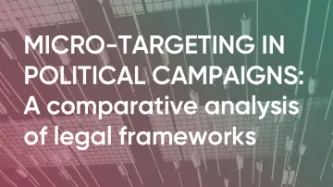Search
Content type: Examples
Article extract:
"French laws designed to prohibit individual-level targeting are circumvented by services like those provided by Paris-based firm Liegey Muller Pons, which aggregates personal data. Such services are no less data-intensive than those unconstrained by such legal requirements."
"• Liegey Muller Pons (LMP) is a digital campaigning firm that has provided services to over 1,000 campaigns across six European countries. French law prohibits individual-level targeting except under…
Content type: Examples
Article extract- translated from the original French.
"A political big data company with close ties to the federal liberals and which worked on Emmanuel Macron's campaign in France is setting up its head office in Old Montreal to continue its growth and take advantage of Montreal's digital vitality.
Data Sciences inc. (DS) was born from the victory of the Liberal Party of Canada (PLC) in the last election. Tom Pitfield, a close friend of Justin Trudeau, was leading digital operations during…
Content type: Long Read
Political parties depend on data to drive their campaigns, from deciding where to hold rallies, which campaign messages to focus on in which area, and how to target supporters, undecided voters and non-supporters, including with ads on social media. Political parties increasingly hire private companies to do the bulk of this work, and our primary concern is how these companies use personal data to “profile” people and drive election campaigning.
As part of PI’s programme of work on Defending…
Content type: Press release
Privacy International announces the launch of two reports as part of its work on Defending Democracy and Dissent.
The report Online Political Ads: A study of inequality in transparency standards builds on our 2019 research findings and delves into the adverse impacts of non-existent or limited transparency on democracy based on two case-studies developed by our partners InternetLab and ELSAM.
The report, Micro-Targeting in Political Campaigns,…
Content type: Report
This paper examines the various legal frameworks governing micro-targeting in political campaigns in six states: Canada, Brazil, France, Italy, Spain and the UK. It aims to assess national practices as well as point out gaps in their respective frameworks. The paper commences by examining how micro-targeting is defined and thereafter examines the legal provisions applicable to micro-targeting activities.
To do this in an accessible way, the paper follows and analyses the series of activities…


